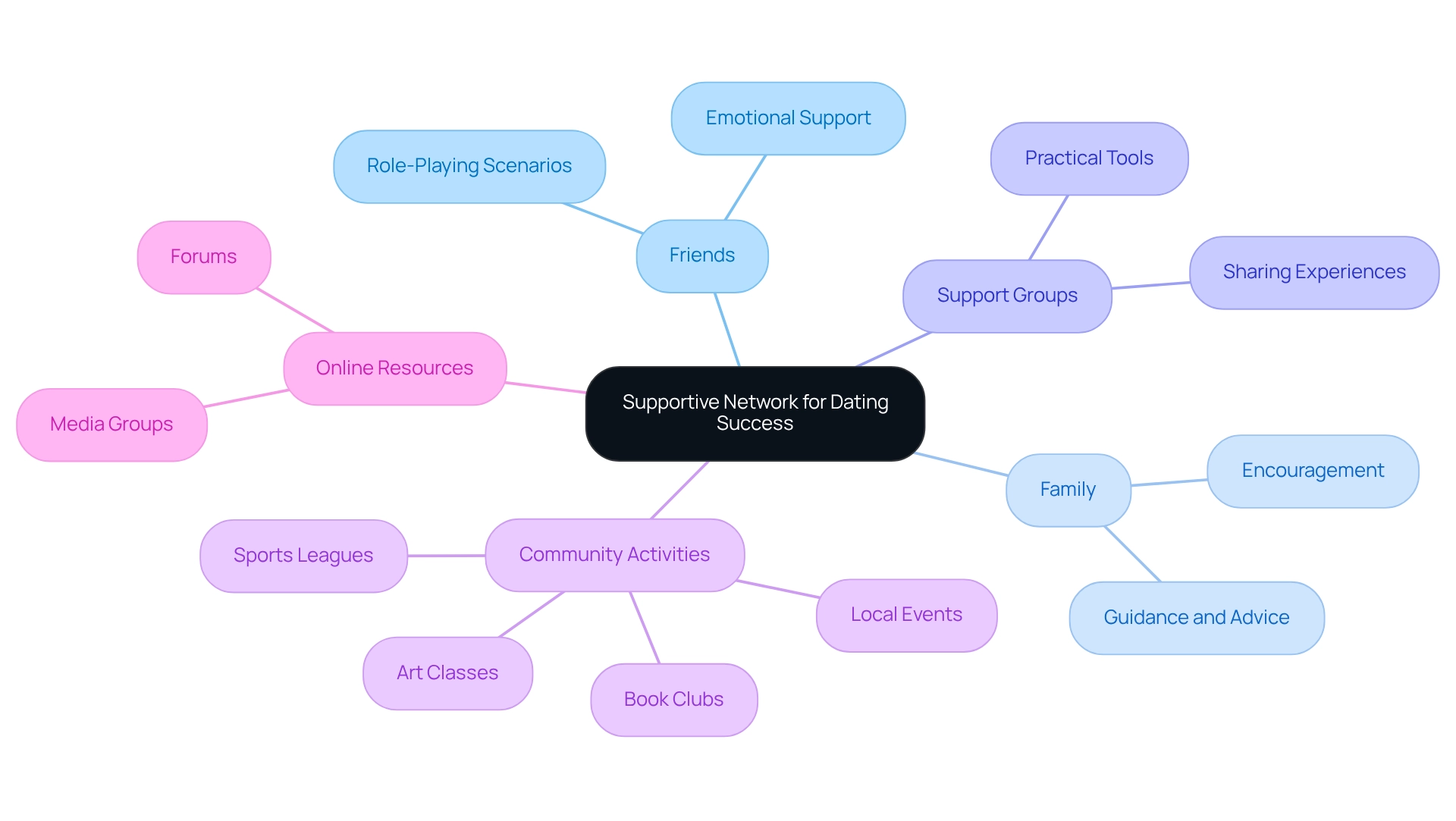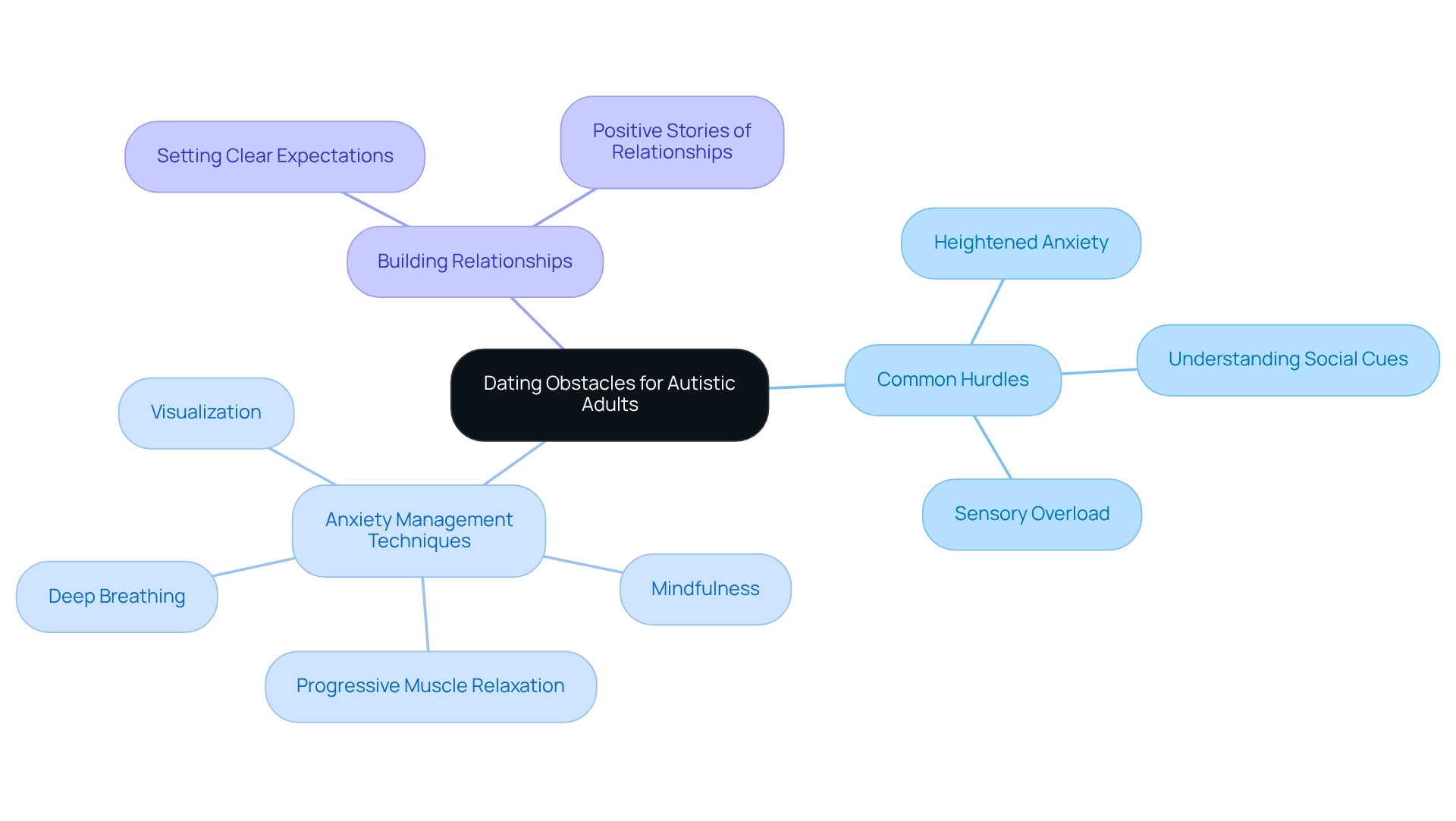Overview
This article highlights four essential steps that autistic adults can take to navigate dating successfully. These steps include:
- Understanding unique challenges
- Implementing effective communication techniques
- Establishing a supportive network
- Identifying common dating obstacles
By recognizing and addressing these challenges—such as social communication difficulties and sensory sensitivities—autistic individuals can enhance their dating experiences and build fulfilling relationships. Strategies like active listening, mindfulness practices, and creating supportive social environments can make a significant difference.
Navigating the dating world can feel overwhelming, but it’s important to know that you’re not alone. Many face similar hurdles, and by sharing experiences and strategies, we can foster a community of support. Have you encountered any specific challenges in your dating journey? Your insights could help others who are facing the same situations.
As you explore these strategies, remember that building a network of understanding friends and allies can provide the encouragement needed to thrive in dating. By taking these steps, you can create a more fulfilling and joyful dating experience. Let’s embrace the journey together and support one another in finding meaningful connections.
Introduction
Navigating the dating landscape can be particularly challenging for autistic adults, who often encounter unique hurdles due to social communication difficulties and sensory sensitivities. The intricate dance of social cues, often taken for granted by neurotypical individuals, can leave many autistic individuals feeling overwhelmed and misunderstood. Understanding these challenges is the first step toward fostering successful and fulfilling relationships.
With the right strategies and support systems in place, autistic adults can enhance their dating experiences and cultivate meaningful connections that defy stereotypes and misconceptions. By exploring effective communication techniques, the importance of a supportive network, and ways to overcome common obstacles, this article sheds light on how autistic individuals can thrive in the dating world.
Understand the Unique Challenges of Dating for Autistic Adults
Dating for autistic adults can be particularly challenging due to social communication difficulties, sensory sensitivities, and the nuances of social cues. Many face significant hurdles in dating for autistic adults, including interpreting non-verbal signals and engaging in casual conversations, which makes initial encounters quite daunting. For example, sensory sensitivities might lead to discomfort during physical interactions or in crowded environments, rendering romantic situations overwhelming. Recognizing these challenges is essential for autistic individuals, as it empowers them to devise strategies for dating for autistic adults and seek the right support. By acknowledging these obstacles, they can cultivate a more positive romantic experience in the context of dating for autistic adults, ultimately boosting their confidence and relationship satisfaction.
Research suggests that practicing mindfulness together can enhance relationship satisfaction by 12%, underscoring the advantages of supportive dating practices. Specific strategies that can significantly improve interactions in dating for autistic adults include:
- Authenticity
- Maintaining eye contact
- Active listening
- Being present during dates
Moreover, Tova Leibowitz, a BCBA and Clinical Director, highlights the transformative potential of behavior analysis techniques, stating, "Can you use ABA therapy on yourself? Discover how behavior analysis techniques are transforming lives through self-directed behavior change strategies."
Insights from the case study titled 'Conclusion on Marriage Among Individuals with Autism' further reveal that, contrary to common misconceptions, these adults can indeed enjoy fulfilling marriages. With understanding, effective communication, and support, they can forge successful relationships, which is particularly important in the context of dating for autistic adults. Ultimately, these components help navigate the complexities of romance, leading to satisfying relationships for individuals on the spectrum.
Implement Effective Communication Techniques in Dating
To enhance communication in dating for autistic adults, individuals on the autism spectrum can utilize various effective methods that foster clarity and connection. Being direct about feelings and intentions is essential; for example, instead of hinting at interest, expressing 'I would like to go out with you' can significantly reduce misunderstandings. Research shows that partner responsiveness accounts for 23% of the variance in relationship satisfaction, highlighting the critical role of clear communication in nurturing positive interactions.
Another vital skill is active listening. This involves maintaining eye contact, nodding, and summarizing what the other person has said to ensure understanding and appropriate responses. Additionally, role-playing potential discussions with a trusted friend can build self-assurance and prepare individuals for real-life engagements, which is especially important in the context of dating for autistic adults, as case studies reveal the unique challenges faced by those on the spectrum in romantic relationships, particularly regarding social engagement and communication. For instance, the case study titled 'Challenges in Romantic Relationships for Autistic Individuals' illustrates how these obstacles can complicate romantic experiences. By recognizing these challenges and employing safety precautions, individuals on the spectrum can navigate dating for autistic adults more effectively. These strategies not only enhance communication but also help in forming deeper connections with potential partners, ultimately enriching their relationship experiences.
It is also important to clarify that the term 'non-autistic', as used in this context, refers to individuals who are not diagnosed with autism, rather than implying neurotypicality, as noted by Rui Ying Yew. This understanding can promote more inclusive discussions around romance and relationships.
Establish a Supportive Network for Dating Success
Establishing a supportive network is essential for autistic adults who are navigating the dating for autistic adults landscape. This network can include friends, family, and support groups, all providing a safe space for individuals to share their experiences and seek advice. By participating in community activities or joining clubs that align with personal interests, individuals not only foster meaningful connections but also create opportunities to meet potential partners in a relaxed setting. For instance, engaging in local events, interest-based groups, or activities like art classes, book clubs, or sports leagues can significantly enhance interpersonal interactions.
Online forums and media groups dedicated to autism serve as valuable resources, offering both emotional support and practical advice. Insights from the NiA-Q study reveal that understanding social networks is vital for improving mental health outcomes, which can directly influence relationship experiences. Rinske M. van den Heuvel highlights that "the term ‘treatment’ in our manuscript does not refer to treatment of ASC itself, but rather to all types of interventions or combinations of multiple interventions that are used to increase mental health and well-being." This underscores the importance of community support in promoting well-being for individuals on the autism spectrum in the context of dating for autistic adults.
Case studies illustrate geographic variations in relationship outcomes for individuals on the autism spectrum, with marriage rates differing significantly across regions. In the U.S., the average marriage rate for individuals on the autism spectrum is approximately 5%, while countries like Sweden and Denmark report rates of 7-8%. These disparities emphasize how cultural and social factors can influence romantic experiences, affecting the availability of potential partners and the social norms surrounding courtship.
By cultivating a strong support network, individuals on the spectrum can approach dating for autistic adults with greater confidence and success. Specific strategies, such as role-playing romantic scenarios with friends or seeking guidance from support groups, can boost confidence and equip individuals with practical tools for managing romantic situations, ultimately making the process more approachable.

Identify and Overcome Common Dating Obstacles
Frequent relationship hurdles for autistic adults in dating often involve heightened anxiety during interpersonal interactions, challenges in understanding social cues, and sensory overload in certain environments. It's important to note that only 9% of individuals with autism are married, in stark contrast to about 50% of the general population. This statistic underscores the significance of these challenges. Research shows that anxiety levels can profoundly affect social engagement, making it essential to address these issues.
To manage dating anxiety effectively, individuals can utilize relaxation techniques such as:
- Deep breathing exercises
- Mindfulness practices before going on dates
- Progressive muscle relaxation
- Visualization
Additionally, choosing sensory-friendly locations—such as quiet cafes or parks—can foster a more comfortable atmosphere, thereby reducing potential stressors. It is crucial to set clear expectations with potential partners regarding communication styles and personal boundaries to alleviate misunderstandings. For example, discussing preferences for direct communication can pave the way for a more open dialogue.
As Fayge Orzel observes, 'However, it demonstrates that individuals on the spectrum can create joyful and thriving marriages,' reinforcing the idea that fulfilling partnerships are indeed possible.
Highlighting positive stories of relationships involving individuals on the spectrum, such as those shared in the case study titled 'Positive Stories of Relationships,' illustrates that many people with autism find love and happiness in their connections. These narratives encourage others to pursue meaningful bonds despite the challenges. By proactively addressing these obstacles, autistic adults can enhance their dating experiences and cultivate lasting relationships.

Conclusion
Navigating the dating world can be particularly daunting for autistic adults, who encounter unique challenges stemming from social communication difficulties and sensory sensitivities. Recognizing these obstacles is essential, as it empowers individuals to develop effective strategies and seek the support they need. This article highlights the importance of understanding social cues, practicing mindfulness, and employing clear communication techniques to enhance dating experiences. By being direct about feelings and intentions, autistic individuals can foster deeper connections and reduce misunderstandings.
Establishing a supportive network is equally crucial. It provides a safe space for sharing experiences and gaining insights. Engaging in community activities and connecting with like-minded individuals can create opportunities for meaningful interactions in a relaxed environment. Moreover, understanding the cultural and social factors that influence dating outcomes can further guide autistic adults in their pursuit of relationships.
Overcoming common dating obstacles, such as anxiety and sensory overload, is vital for success. By employing relaxation techniques and selecting sensory-friendly venues, individuals can create a more comfortable dating experience. Setting clear expectations and discussing communication preferences can also mitigate misunderstandings, paving the way for fulfilling partnerships.
Ultimately, with the right tools, support, and understanding, autistic adults can thrive in the dating landscape. Their ability to form meaningful connections challenges stereotypes and proves that love and happiness are attainable, regardless of the hurdles faced. Embracing these strategies not only enhances individual experiences but also contributes to a more inclusive understanding of relationships in society.
Frequently Asked Questions
What challenges do autistic adults face in dating?
Autistic adults face challenges such as social communication difficulties, sensory sensitivities, and interpreting non-verbal signals, which can make initial encounters and casual conversations daunting.
How do sensory sensitivities affect dating for autistic individuals?
Sensory sensitivities may lead to discomfort during physical interactions or in crowded environments, making romantic situations overwhelming for autistic individuals.
What strategies can help improve dating experiences for autistic adults?
Strategies that can enhance dating experiences include authenticity, maintaining eye contact, active listening, and being present during dates.
How can mindfulness practices impact relationship satisfaction?
Research suggests that practicing mindfulness together can enhance relationship satisfaction by 12%, highlighting the benefits of supportive dating practices.
Can autistic adults have fulfilling marriages?
Yes, autistic adults can enjoy fulfilling marriages with understanding, effective communication, and support, which are essential for successful relationships.
What role does behavior analysis play in dating for autistic adults?
Behavior analysis techniques can be transformative for autistic individuals, allowing them to implement self-directed behavior change strategies that improve their dating experiences.




